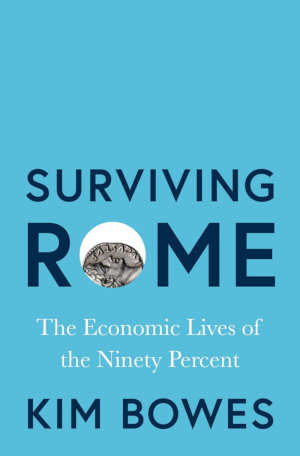Kim Bowes Surviving Rome review, recensie en informatie boek over het economische leven van negentig procent van de Romeinen. Op 4 november 2025 verschijnt bij Princeton University Press het boek van Kim Bowes, hoogleraar archeologie en oude geschiedenis aan de Universiteit van Pennsylvania, over de gewone Romein. Er is geen Nederlandse vertaling van het boek verkrijgbaar.
Kim Bowes Surviving Rome review en recensie
- “Finally, someone has written an economic history of Rome for the twenty-first century! In Surviving Rome, Kim Bowes does no less than challenge the whole field of ancient economic history, presenting us with a summons to think more empathetically about how ordinary Romans hustled, borrowed, and scraped to get by. She answers her own call with a radically new but highly current account of the Roman economy. This is a firecracker of a book, deeply researched and marvelously written, and I could not recommend it more.” (Seth Bernard, author of Building Mid-Republican Rome: Labor, Architecture, and the Urban Economy)
- “Surviving Rome explores the stress and strains, precarities and strategies of the people—the ordinary men, women, and children, enslaved and free—who shaped the world’s first ‘global’ economy. This is a brilliantly insightful microeconomic history that brings working people and their practices back into the Roman economy. Everyone interested in premodern economies should read this deeply perceptive and engagingly written book.” (Claire Taylor, author of Poverty, Wealth, and Well-Being)
Surviving Rome
The Economic Lives of the Ninety Percent
- Auteur: Kim Bowes (Verenigde Staten)
- Soort boek: Amerikaanse geschiedenis
- Taal: Engels
- Uitgever: Princeton University Press
- Verschijnt: 4 november 2025
- Omvang: 512 pagina’s
- Uitgave: gebonden boek / ebook
- Prijs: $ 39,95
- Boek bestellen bij: Amazon / Bol / Libris
Flaptekst van het boek van Kim Bowes over de gewone Romein
A radical revision—and worker’s-eye view—of everything we thought we knew about the ancient Roman economy.
The story of ancient Rome is predominantly one of great men with great fortunes. Surviving Rome unearths another history, one of ordinary Romans, who worked with their hands and survived through a combination of grit and grinding labor.
Focusing on the working majority, Kim Bowes tells the stories of people like the tenant farmer Epimachus, Faustilla the moneylender, and the pimp Philokles. She reveals how the economic changes of the period created a set of bitter challenges and opportunistic hustles for everyone from farmers and craftspeople to day laborers and slaves. She finds working people producing a consumer revolution, making and buying all manner of goods from fine pottery to children’s toys. Many of the poorest working people probably pieced together a living from multiple sources of income, including wages. And she suggests that Romans’ most daunting challenge was the struggle to save. Like many modern people, saving enough to buy land or start a business was a slow, precarious slog. Bowes shows how these economies of survival were shared by a wide swath of the populace, blurring the lines between genders, ages, and legal status.
Drawing on new archaeological and textual evidence, Surviving Rome presents a radical new perspective on the economy of ancient Rome while speaking to the challenges of today’s laborers and gig workers surviving in an unforgiving global world.

